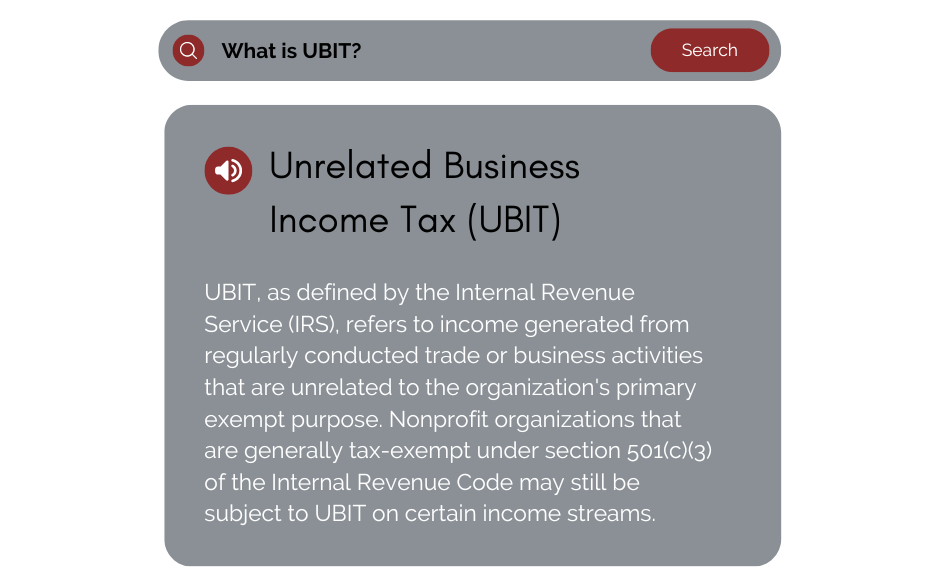
When it comes to nonprofit accounting, understanding the concept of Unrelated Business Income Tax (UBIT) is crucial. UBIT is a tax imposed on the income generated by tax-exempt organizations through unrelated business activities. In this blog post, we will explore what UBIT is, its importance for nonprofits, and delve into the types of activities typically identified as UBIT and the specific exclusions provided by the IRS.
What is ubit?

Identifying Income-Generating Activities Subject to UBIT:
To ensure compliance with UBIT regulations, nonprofit organizations need to be aware of the types of activities that are considered unrelated to their exempt purpose and may trigger UBIT. The following activities are typically subject to UBIT:
-
Trade or business activities regularly carried out by the organization that are unrelated to its exempt purpose.
Nonprofit organizations may engage in trade or business activities that are separate from their primary exempt purpose. These activities can include operating a gift shop, publishing a magazine, or running a commercial venture. If the income generated from these activities is substantial and not directly connected to the organization’s exempt purpose, it may be subject to UBIT.
-
Income generated from the sale of products or services that are not substantially related to the organization’s mission.
Nonprofits often rely on revenue generated from the sale of products or services to support their operations. However, if these products or services are not substantially related to the organization’s mission, the income derived from them may be subject to UBIT. For example, if a conservation-focused nonprofit sells unrelated merchandise like clothing or accessories, the income from those sales could trigger UBIT.
-
Rental income from real estate or property if certain conditions are met.
Nonprofit organizations may own or lease real estate or property and generate rental income from it. While rental income is generally not subject to UBIT, there are specific conditions that, if met, can make it taxable. For instance, if a nonprofit rents out a portion of its property to a for-profit business, or if it operates parking lots or advertising space on its premises, the rental income from those activities could be subject to UBIT.
-
Income from certain investments, such as debt-financed property or limited partnerships.
Nonprofits often invest their funds to generate income for their mission. However, certain types of investments can trigger UBIT. For example, if a nonprofit acquires debt-financed property (real estate purchased with borrowed funds) and generates income from it, a portion of that income may be subject to UBIT. Similarly, income derived from limited partnerships in which the nonprofit has an ownership interest can also be subject to UBIT.
It’s important for nonprofit organizations to carefully analyze their income-generating activities and determine whether they fall within these categories. By identifying potential UBIT liabilities, nonprofits can proactively address their tax obligations, maintain compliance, and allocate resources accordingly. Consulting with a knowledgeable tax professional or accountant who specializes in nonprofit taxation can provide valuable guidance in navigating the complexities of UBIT and ensuring accurate reporting.
Instances Where UBIT Does Not Apply:
While UBIT applies to many income-generating activities, there are certain exceptions outlined by the IRS. Nonprofit organizations are not subject to UBIT if:
The income is generated from activities substantially conducted by volunteers.
Nonprofit organizations rely heavily on the efforts of volunteers to carry out their activities. The IRS recognizes this and provides an exemption for income generated from activities that are substantially conducted by volunteers. If the income is primarily a result of volunteer efforts, such as a fundraising event organized and run by volunteers, it would typically be exempt from UBIT.
The income is received from passive sources, such as dividends, royalties, or interest.
Passive income sources, such as dividends from investments, royalties from intellectual property, or interest earned from bank accounts or bonds, are generally not subject to UBIT. Nonprofit organizations can earn income passively without triggering UBIT if the income is not derived from an unrelated trade or business activity.
The income falls under specific exclusions or exceptions provided by the IRS.
The IRS has outlined specific exclusions and exceptions that may apply to certain types of income generated by nonprofit organizations. These exclusions or exceptions are designed to provide relief from UBIT for income sources that align with the organization’s exempt purpose. Some common exclusions include income from qualified sponsorships, certain fundraising activities, and certain research-related activities. It is important for nonprofits to consult the IRS guidelines and seek professional advice to determine whether their income qualifies for these exclusions or exceptions.
Understanding these exceptions and exclusions is essential for nonprofit organizations to accurately determine their UBIT liabilities. By leveraging the exemptions provided by the IRS, nonprofits can minimize their UBIT obligations and allocate resources more effectively towards their mission-driven activities.
Maintaining compliance with UBIT regulations requires a comprehensive understanding of the specific activities subject to UBIT as well as the exclusions and exceptions provided by the IRS. Nonprofits should consider consulting with tax professionals or accountants experienced in nonprofit taxation to ensure accurate reporting, minimize tax liabilities, and preserve their tax-exempt status.
Understanding How UBIT is Calculated:
Nonprofit organizations that engage in activities subject to UBIT must calculate and report their UBIT using Form 990-T, Exempt Organization Business Income Tax Return. UBIT is calculated by deducting allowable expenses directly connected to the unrelated business activities from the gross income generated. The remaining net income is then taxed at the appropriate corporate tax rate.
The Impact of UBIT on Nonprofit Organizations:
Compliance with UBIT regulations is essential for nonprofits to maintain their tax-exempt status and avoid penalties. It’s crucial for organizations to understand the potential consequences of failing to report UBIT accurately. Failure to pay UBIT or include it in the organization’s annual tax return can result in financial penalties, loss of tax-exempt status, and potential audits by the IRS.
Navigating UBIT: Ensuring Compliance and Financial Stability:
To ensure compliance with UBIT and maintain their tax-exempt status, nonprofit organizations must have a comprehensive understanding of UBIT and its implications. By comprehending what activities are subject to UBIT and how it is calculated, nonprofits can ensure compliance with tax regulations. Consulting with a professional accountant experienced in nonprofit accounting can provide invaluable guidance and help navigate the complexities of UBIT, safeguarding the organization’s financial stability and long-term success.
Share This Post:

Chazin
With over 20 years working exclusively with nonprofits, we pride ourselves in having a unique understanding of nonprofit accounting needs. We believe that nonprofits deserve personalized, quality service and should not settle for a one-size-fits-all approach. We collaborate with you to provide a fully virtual and customized solution that is not only cost-effective but also strengthens your accounting function. We offer a team of industry experts at your disposal to provide advice, leading technology, and to supplement existing staff to improve efficiency and compliance.